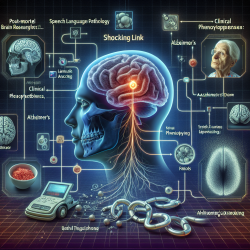Introduction
In the quest to understand Alzheimer's disease (AD) and improve clinical outcomes, recent research has unveiled a groundbreaking approach using post-mortem brain donor medical records. The study titled Dimensional clinical phenotyping using post-mortem brain donor medical records: post-mortem RDoC profiling is associated with Alzheimer's disease neuropathology explores the association between cognitive symptom dimensions and neuropathological changes in the brain. This blog aims to help practitioners enhance their skills by implementing the outcomes of this research or by encouraging further investigation.
The Study: A Brief Overview
The study conducted by Vogelgsang et al. (2023) adapted well-validated methodologies to compute National Institute of Mental Health Research Domain Criteria (RDoC) scores using natural language processing (NLP) from electronic health records (EHRs) of post-mortem brain donors. The primary aim was to test whether cognitive domain scores were associated with Alzheimer's disease neuropathological measures. The results confirmed a significant association between EHR-derived cognitive scores and neuropathological findings, particularly neuritic plaques.
Key Findings
- Higher neuropathological load, especially neuritic plaques, was associated with higher cognitive burden scores in the frontal, parietal, temporal, and occipital lobes.
- NLP-based methodologies can obtain quantitative measures of RDoC clinical domains from post-mortem EHRs.
- This approach may accelerate post-mortem brain research beyond classical case-control designs.
Implications for Practitioners
For practitioners, these findings offer several actionable insights:
- Adopt NLP Techniques: Implement NLP-based methodologies to analyze patient records. This can provide a more nuanced understanding of cognitive symptoms and their associations with neuropathological changes.
- Focus on Dimensional Phenotyping: Move beyond categorical diagnoses to adopt dimensional phenotyping approaches. This can help in identifying specific symptom dimensions and their underlying pathophysiological mechanisms.
- Collaborate with Researchers: Engage in collaborative research efforts to validate and refine these methodologies further. This can contribute to a more comprehensive understanding of Alzheimer's disease and other neuropsychiatric disorders.
Encouraging Further Research
While this study provides a proof of concept, there is a need for further research to validate these findings across larger and more diverse cohorts. Practitioners are encouraged to participate in or initiate research projects that explore the following areas:
- Longitudinal Studies: Conduct longitudinal studies to track cognitive symptoms and neuropathological changes over time. This can provide deeper insights into the progression of Alzheimer's disease.
- Broader Clinical Domains: Expand the scope of research to include other clinical domains beyond cognition, such as mood, anxiety, and motor functions. This can help in understanding the full spectrum of symptoms associated with Alzheimer's disease.
- Integration with Other Data Sources: Integrate NLP-derived phenotypes with other data sources, such as genetic and imaging data. This can provide a more holistic view of the disease and its underlying mechanisms.
Conclusion
The study by Vogelgsang et al. (2023) represents a significant step forward in the field of post-mortem brain research. By leveraging NLP and dimensional phenotyping approaches, practitioners can gain a more nuanced understanding of Alzheimer's disease and its neuropathological underpinnings. This, in turn, can lead to more targeted and effective interventions for patients.
To read the original research paper, please follow this link: Dimensional clinical phenotyping using post-mortem brain donor medical records: post-mortem RDoC profiling is associated with Alzheimer's disease neuropathology.










